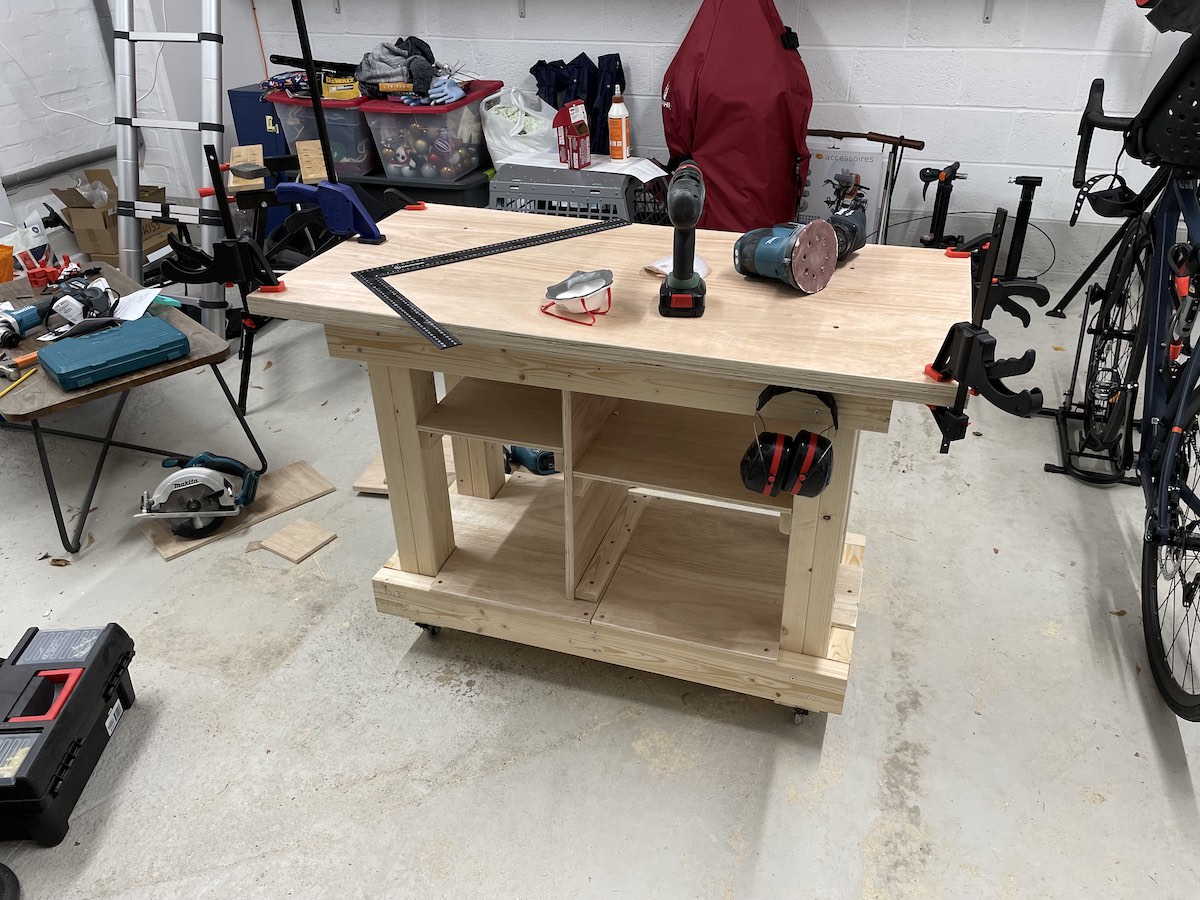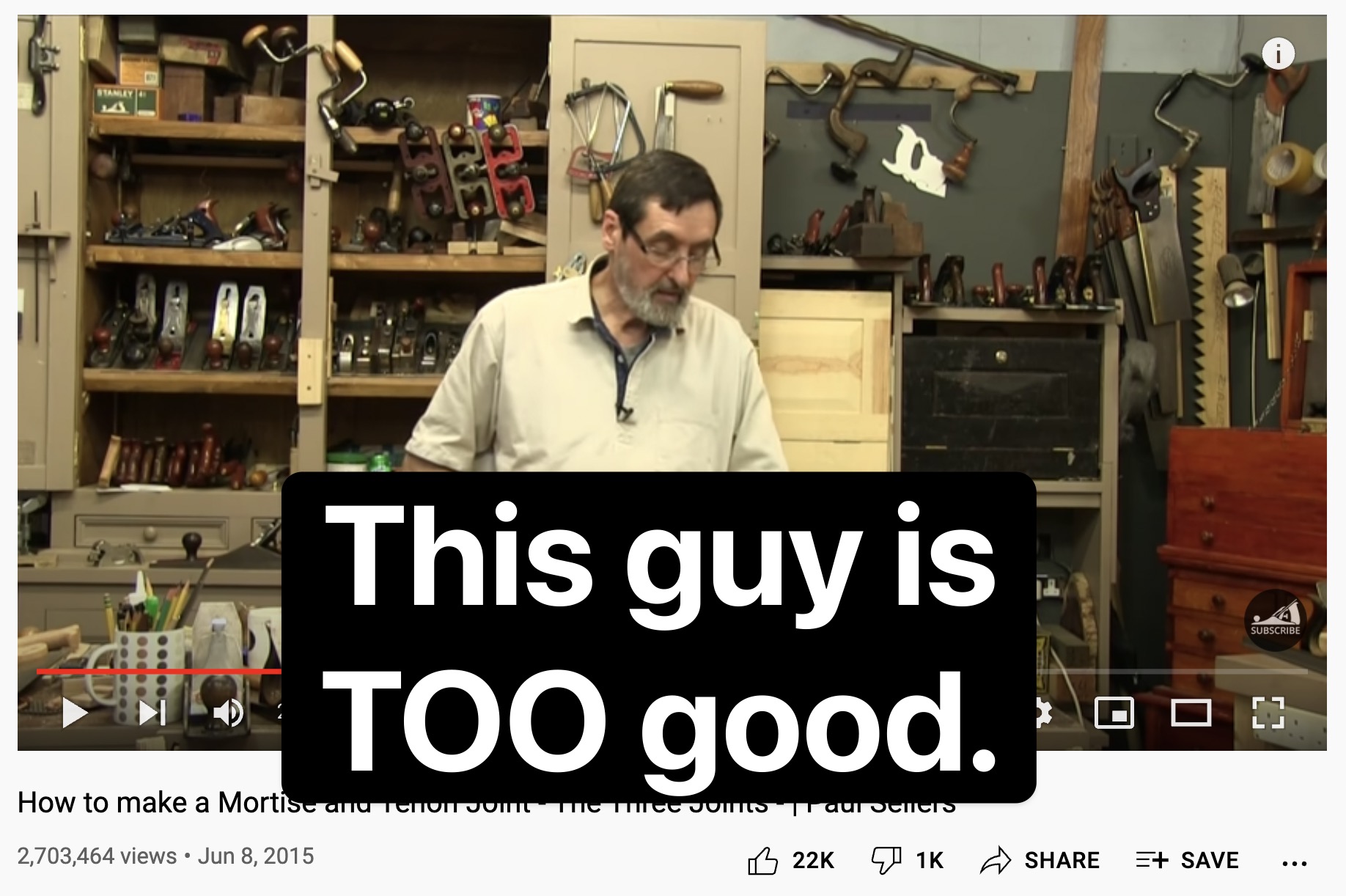Lately I've been getting into woodworking.
...And it's been a struggle. I haven't felt this much out of my comfort zone in a while.
Prior to this new hobby, piecing together boards from IKEA was pretty much the extent of my "building physical things" experience.
Now, I've kitted out the garage with a chop saw, circular saw, jigsaw, orbital sander, and a bunch of other bits and bobs.
I even completed my first real project – a mobile workstation!
(It's not the prettiest. Zoom in and you'll see plenty of mistakes. But I did it.)
As a newbie, I hate learning from experts!
In order to learn how to turn 2x4's into something useful, I've gone down the YouTube rabbit hole.
Some of the creators I've found who, inarguably, produce beautiful things with seemingly minimal effort frustrate the hell out of me.
How do they make this look so easy?
But I know how. It's because they've been doing this for years. It's now second nature for them.
Which reminded me of a weekend workshop I once ran back during my agency days...
It was a beginners workshop on building a simple web app with Ruby on Rails (a web framework), and about 10-ish people attended.
Most of the participants were fairly technical. They'd built basic websites or dabbled around in PHP code.
Except this one guy.
He couldn't figure out how to install Ruby on his MacBook. He didn't know where to start. He wasn't sure what a "command prompt" was. And on, and on, and on.
And the worst part?
I had forgotten what it was like to learn something like the command prompt – something that was second nature to me!
It'd been so long since I'd been in the position where I had to start totally from scratch that I absolutely couldn't relate to what he was going through, and I was quickly running out of patience.
Now, this wasn't his fault. I should have made it clearer from the get-go who the workshop was for, or at least had some sort of guide to send everyone in advance.
But the fact was that I struggled to teach him anything. I let him down.
What he really needed was to learn from someone just a few steps beyond where he is now. Someone who knew what he was going through. Someone who had very recently been where he is now, and where that experience was still raw enough that he could both empathise and teach well.
The trap of expertise
It can seem like you're not good enough.
Or that you have nothing original to say.
Or that you're just going to be another voice in a loud and already crowded room.
But the upside to being a creator that works online is that you don't need to worry about being the universal authority or the sole, universal expert – because no one is, or ever will be.
Instead, all you need to do is find a small group of people who look up to you as the authority and the expert.
There are a heck of a lot of people out there.
And these people all have different ways of learning, have different backgrounds, and have different types of personalities that they get along well with.
You have a backstory and other, often complementary skills and experiences that can help a group of people significantly more than anyone else can.
That expert? The one standing atop their ivory tower, who's been doing this for decades and is, empirically, infinitely better than you at this stuff...?
They can't help & teach some people nearly as effectively as you can.
Until you internalise this, you're going to constantly compare yourself to them and doubt that you can, or even should, say anything.
But you should.
And you can.
This was hard for me to write
I'm not that great at saying motivational things.
The engineer-turned-marketer in me retreats to my safe space: analytics, tactics, do-this-then-that-and-profit!, and so on.
But it's good to leave your comfort zone from time to time.
Yesterday I was interviewed for a podcast, and we started talking about authority and expertise.
I made it clear that it's been a very long time since I've truly started from scratch. Create & Sell, which only started last February, was seeded by the influence I built growing my other business, Double Your Freelancing, to a list of 50k+ and then RightMessage to 10k+.
"Take what I'm about to say with a grain of salt. It's been a while."
I gave a brief monologue that covered most of what I said above, and then brought up while someone who's truly experienced and has been doing something for a while might not be all that useful in the immediate sense, they should be put up on a pedestal of what you're working toward: your north star.
For example, Paul Sellers.
He's been woodworking for 40-something years. I think he just built his own house from scratch. And, in his videos, he doesn't even bother with using power tools.
I want to be as awesome as Paul... one day.
But right now, I'm getting so much more from people who are more like me and screw up. People who just recently discovered what a "drill press" was.
They're helping me here and now, but one day I want to grow up and learn from Paul.
Whatever end of the spectrum you're at for your particular field, just know that you do have something to say to someone.
People will move on from you (unsubscribe, not buy, whatever.) If you can't help someone, either because you're too advanced or too basic, that's perfectly OK because there are like 5 billion people on the Internet in 2021.
And if you think you don't have anything original to say, don't discount the value of research, curation, and synthesis.
If some other developer-turned-woodworker had bothered putting together a YouTube video that explained that jigs were basically like function calls (or, for marketers, like content snippets) then I would have immediately understood their value.
I wouldn't need, or expect, the person who taught me that to have discovered the jig.
They would have just had to position it in a way that made sense to me.
That's effective teaching, and that's what's required for substantial learning.

